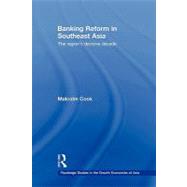- ISBN: 9780415673884 | 0415673887
- Cover: Nonspecific Binding
- Copyright: 4/14/2011
This book empirically examines banking reform in the economies of Southeast Asia as they sought to adapt to major developments in the global economic system over the past three decades, including the globalisation of finance, the debt crisis of the 1980s and the 1997-1998 Asian financial crisis. Focusing in particular on the turbulent decade of financial boom and bust from 1994 to 2004, it explores the ways in which states respond to powerful external shocks and the implications for policy choices, demonstrating how different political systems shape economic performance and policy choices. It sets out a detailed comparative analysis of the experiences of the five major regional economies, Malaysia, Singapore, Thailand, Indonesia and the Philippines, considering how banking reform responded to the challenges posed by global economic integration. The countries least affected by the crisis, Singapore and the Philippines, used the crisis effectively to further liberalise long-protected domestic banking sectors. The countries the most affected by the crisis, Indonesia, Thailand and Malaysia, all resisted external pressure to liberalise their protected banking sectors even when they experienced changes in leadership. In all five cases, the nature of the political system and their previous commitment to nationalist banking policies, more than the depth of the crisis or extent of foreign pressure, was the key determining factor in their crisis response and in the post-crisis changes to banking policy that are still playing out today.







